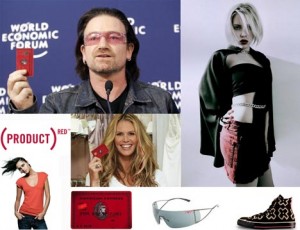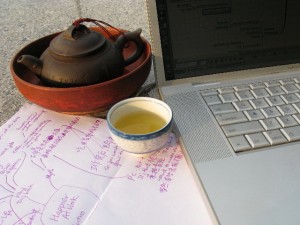「企業,尤其是中小型私人企業,可能是能改變個人及社會的最有效組織。」朱平
企業的社會責任不只是關懷社會環境而已。企業最直接社會責任是:提供一個有意義、能成長的健康環境,讓所有利害關係人(stakeholders)都因為企業的經營理念、經營方式而開始往“正向循環”(positive spiral)。
台灣有97.8%的企業都是中小型私人企業,就業人數為765萬8千人。只要我們能啟發這些中小企業經營者,讓他們知道雖然他們沒有機會成為〈天下〉、 〈遠見〉雜誌中,最有社會責任(CSR)的名單之一;但他們其實是最能影響個人社會機夠組織的人。中小型私人企業最容易改變,因為只要經營者的觀念改變, 有勇氣、決心以及行動,整個企業就可以改變,而不必再為每季的股票價值而犧牲“做真實的自己”的人生價值觀。
「朱平先生您好!今天我買了ICB雜誌,看完了您的專欄有份衝動想要訴說???或許您也看出了我的迷惘???。」
「工作已經變成不得不做的事情,一切都是無彩色的。我覺得我設計、創作了好多垃圾???。」
「記得之前我立下志向說,我將來想做的工作要能帶給人們快樂與感動??。」
「I’m not afraid of making wrong decisions, but am afraid of spending too much time on trying and fooling around…..。」
以上是我收到的年輕讀者對我上次專欄〈有意義的活著或用力的活著〉所提出的迷惑以及想法。在我一一的回信中,我都強調:其實他們都已經有答案了,所需要的僅是勇氣和行動。這是他們必須要自己學的功課,沒有任何人可以替他們學。
我一直認為在未來﹝其實事實上已經發生了﹞,隨著非營利組織(NPO)以及非政府組織(NGO)的影響力越來越大,是時候讓我們思考營利社會企業(For Profit Social Enterprise)的可能性。
 不管是U2的主唱Bono及DATA共同推出“Product RED”品牌﹝www.joinred.com﹞,跟時尚聯合,提升品牌形象;為The Global Fund募款,對抗愛滋貧窮,關懷世界;還是諾貝爾和平獎得主穆罕默德尤納斯跟法國食品公司Danone合作成立工司製造yogurt營養品,以解決印度 的貧窮〔http://money.cnn.com/magazines/fortune-article/2007/02/05/8399198 /index.htm〕,這都是一個重要的營利社會企業(For Profit Social Enterprise)里程碑。
不管是U2的主唱Bono及DATA共同推出“Product RED”品牌﹝www.joinred.com﹞,跟時尚聯合,提升品牌形象;為The Global Fund募款,對抗愛滋貧窮,關懷世界;還是諾貝爾和平獎得主穆罕默德尤納斯跟法國食品公司Danone合作成立工司製造yogurt營養品,以解決印度 的貧窮〔http://money.cnn.com/magazines/fortune-article/2007/02/05/8399198 /index.htm〕,這都是一個重要的營利社會企業(For Profit Social Enterprise)里程碑。
我個人認為,營利社會企業(For Profit Social Enterprise)最重要的價值並不僅是因為這種社會企業會將利潤回饋給特定的被捐助者﹝環保、愛滋、流浪狗、文化表演藝術???﹞,其最大的價值, 是在能真正的提供在此社會企業工作的人,找到工作的意義以及生命的價值。我也相信在21世紀一些最有創意、最優秀的人都會主動尋求在這種社會企業中工作。
We Vote with What We Buy
我們每一次的購買行為,都是一次投票。要能讓社會企業成功,消費者的覺醒是先決條件,千萬不要低估了我們每個人的影響力。如果我們每花一塊錢,都不僅是購 買產品或服務而已,而是購買這產品或服務後面所代表的價值。那麼社會企業就能得到您的消費﹝投票﹞支持,而能產生利潤,並且將這些利潤投資回饋至特定的社 會公益團體。
我真正的夢想是,有一天這些社會企業會組織整合成一個生態系統(eco-system)。每個人跟企業都互相依賴(Inter-dependent),互 相連結(Inter-connected),不會受到惡質的零和競爭,成為企業經營的另一種模式,這世界也會因為這種生態系統而更好。
We Create Our Future Work
當我們每個人都知道自己是有能力來選擇哪一家企業值得您的投票時,就會有愈多的Social Enterprise生存下來。誰知道?有一天您可能會在這些社會企業工作。事實上,您是用您的消費行為創造您自己,甚至您的小孩未來的工作機會。
Every purchase decision is a vote of support. Your every decision tells people whom you support.
在下一期專欄,我希望能用開放式討論(Open Forum)來分享我們的學習與成長。煩請用email分享您們的挑戰與迷惑,我將在專欄中跟大家分享我的看法及建議。謝謝所有寫e-mail給我的朋 友,謝謝所有寫e-mail給我的朋友,讓我感受到您們的用心以及充滿智慧的問題。讓我也有機會再年輕一次。
我要再一次邀請所有讀者寫信給我,不管是問問題也好,或是有任何不同意見,我都期待與歡迎。畢竟,沒有互動就沒有參與,沒有參與就沒有擁有,唯有擁有,你才會真心改變。
家庭作業Home Assignment:
- 您是一個覺醒的消費者嗎?回顧過去一個月中,您買了甚麼東西?您決定購買的原因是便宜、折扣、方便、名人推薦,還是因為您願意花時間認識這企業,真心要支持這個企業所代表的價值而購買?


Dear Cindy:
I had a major crash on my Entourage in my MacBook. I lost most of my email files.
You are absolutely right that the PFP enterprise requires a Socially responsible individual. I propose a new philosophy of 1% and We Vote With What We Buy fo a long time. I know it is a tough journey. However, with young people like you, I belive Taiwan has moved quickly to a developed country lifestyle. It is not bad actually comparing with the win at all cost mantra. If we focus on quality and intellectual based lifestyle, I think one day Taiwan could become another Demark. I visited Copehagan not long ago. I realized that theier lifestyle in aestheticity and leisure have become an export business model. All the friends I met in Copenhagan are not rich. They just live a life they choose to. They are content with the simple way of living with volunteered frugality. However, everthing they purchased are quality with design. There is no cheap fashion concept in most of my friends’ fashion statement. They are more into the durablity and classic design.
My mission is to remind small business owners that they can transform their business into a PFP enterprise so they will have a higher prupose in their business, more fulfilling than passing wealth to their children.
Let’s keep connecting and spreading PFP Busienss concept.
Ping
Dear Ping
I am Cindy, a 23-year-old postgraduate student majoring in economics.
I’m really inspired by your last entry “Profit for Purpose Enterpirse” on the yahoo fashion website. I think the term “PFP” is very beautiful! It perfectly describes what an enterprise should see itself as.
I’ve also read your other entry “Socially Responsible Consumerism (SRC); For-Profit Social Enterprise”. And I would like to point out that not only do we need to promote the idea of SRC, but in the B2B world, or for internal management purposes, promoting the idea of “Socially Responsible Individual” is extremely prominent when it comes to the realization of a PFP.
If you have time, I’ve spent you an e-mail sharing my notes and thoughts about PFP and SRC to your pingc@canmeng.com.tw mailbox. Please take a look!
It would be lovely to have your feedbacks enlightening young and naive people like myself 🙂
Thanks,
Cindy
Dear Mark:
I agree with you that we do confuse by these trending terms. Now, everyone is talking about CSR and Social Enterprise. It has blurred the line sometime.
If you read my comments in this blog closely. I really try to use a different term to re-define what i think would be more sustainable. I tried to use for-profit social enterprise to differentiate the enterprise from those company that was hostaged by quarterly report from stock market. They tried to maximize the share holder value so their stock price can go up and the short term investor ( opportunists ) can cash out.
i try not to use ” Social ” word in describing this kind of business. This is why I prefer to use conscience business or responsible business.
Basically, I think the ultimate CSR for any corporation is to create an environment to integrate work and life for their employee.
I think you need to google more on your own part and share with my what you have found out. This is the only way you can learn.
I am sorry that I am not the right people to answer this question. I try not to trapped myself with the definition. I am more interested in what we can create a business platform so talented and enlightened people can participate in something that is bigger then themselves.
Thanks for asking.
Ping
What’s the difference between social enterprise and corporate social responsibility?